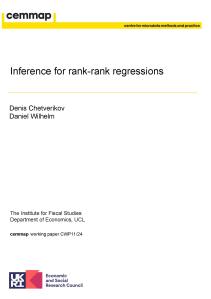We propose a new statistical test of the stochastic dominance efficiency of a given portfolio over a class of portfolios. We establish its null and alternative asymptotic properties, and define a method for consistently estimating critical values. We present some numerical evidence that our tests work well in moderate-sized samples.
Authors
Journal article details
- DOI
- 10.1111/ectj.12016
- Publisher
- Wiley
- Issue
- May 2014
Suggested citation
O, Linton and T, Post and Y, Whang. (2014). 'Testing for the stochastic dominance efficiency of a given portfolio' (2014)
More from IFS
Understand this issue

Gender norms, violence and adolescent girls’ trajectories: Evidence from India
24 October 2022

What are the challenges in getting debt on a falling path?
28 June 2024

Election Special: Your questions answered
27 June 2024
Policy analysis

ABC of SV: Limited Information Likelihood Inference in Stochastic Volatility Jump-Diffusion Models
We develop novel methods for estimation and filtering of continuous-time models with stochastic volatility and jumps using so-called Approximate Bayesian Compu- tation which build likelihoods based on limited information.
12 August 2014

Assessing the economic benefits of education: reconciling microeconomic and macroeconomic approaches
This CAYT report discusses the strengths and limitations of several approaches to assessing the effect of education on productivity.
14 March 2013

Misreported schooling, multiple measures and returns to educational qualifications
We provide a number of contributions of policy, practical and methodological interest to the study of the returns to educational qualifications in the presence of misreporting.
1 February 2012
Academic research

Inference for rank-rank regressions
28 May 2024

Understanding Society: minimising selection biases in data collection using mobile apps
2 February 2024

The impact of labour demand shocks when occupational labour supplies are heterogeneous
28 June 2024
